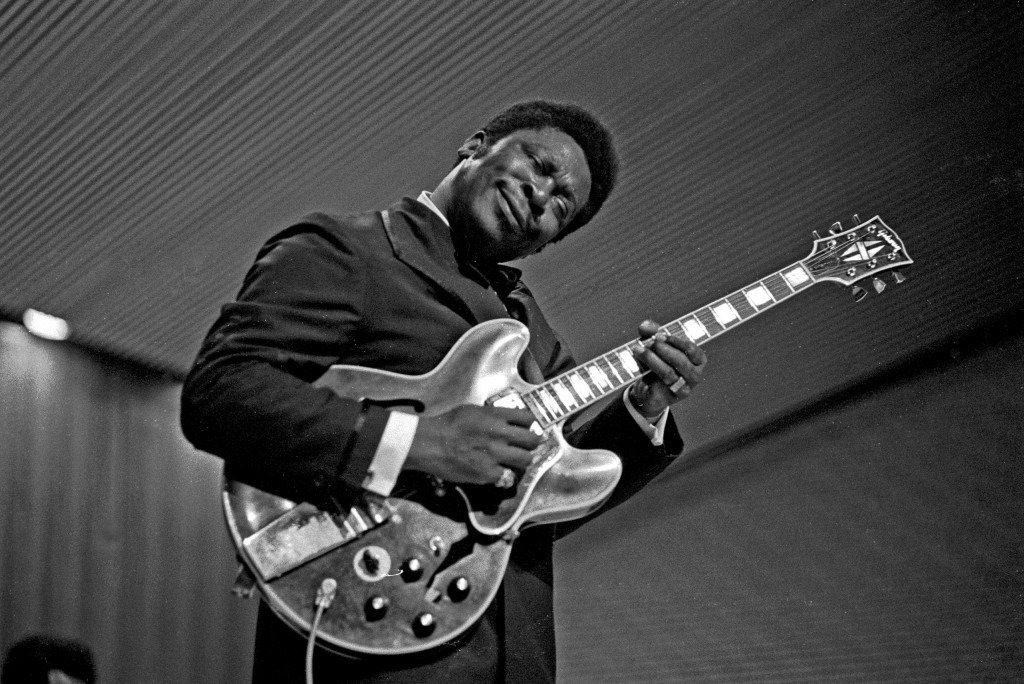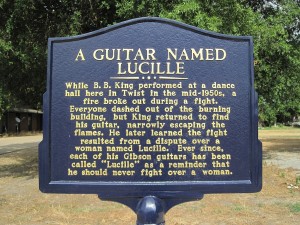 The news of blues legend B.B. King’s passing last week brought back a torrent of memories for a music icon I have long admired. While I had always passively enjoyed his music, it wasn’t until I saw him live in 1979 at Chicago’s Park West with fellow consultant Alan Burns that I realized what an amazing performer the man born as Riley B. King truly was. Ironically, I went back home to Detroit only to discover that King was booked at a club embedded in the Dearborn Hyatt Regency – so I saw him play again that weekend. Over the years, I came to enjoy B.B. King concerts, saddened only by seeing the bigger-than-life legend having to perform while sitting in a chair in recent years. In reading over some of the tributes that have been written over the past few days, it became even clearer to me how B.B. truly had a deep understanding of his craft and its impact on audiences around the world. And for those of us in radio, he teaches us important lessons about our careers and about life. So in celebration of this iconic performer, here are my top 10 B.B. King nuggets that we can all learn from:
The news of blues legend B.B. King’s passing last week brought back a torrent of memories for a music icon I have long admired. While I had always passively enjoyed his music, it wasn’t until I saw him live in 1979 at Chicago’s Park West with fellow consultant Alan Burns that I realized what an amazing performer the man born as Riley B. King truly was. Ironically, I went back home to Detroit only to discover that King was booked at a club embedded in the Dearborn Hyatt Regency – so I saw him play again that weekend. Over the years, I came to enjoy B.B. King concerts, saddened only by seeing the bigger-than-life legend having to perform while sitting in a chair in recent years. In reading over some of the tributes that have been written over the past few days, it became even clearer to me how B.B. truly had a deep understanding of his craft and its impact on audiences around the world. And for those of us in radio, he teaches us important lessons about our careers and about life. So in celebration of this iconic performer, here are my top 10 B.B. King nuggets that we can all learn from:
- Every legend needs a great story. In B.B. King’s case, the narrative has always been about his famous guitar, Lucille, and how it got its name. As the plaque below shows, that guitar became a “she” during a fight at a dance hall in Twist, Arkansas. During the scuffle, these two guys kicked over a kerosene stove that started a fire. King rescued his guitar from the flames, and later found out the fight was over a woman named Lucille. That event became part of the B.B. King legend, providing the blues man with Lucille stories that illuminated his concerts. After two marriages and 15 children from 15 different women, Lucille became the only “female” King could trust. In radio, great stories like Steve Dahl’s “Disco Demolition” or Bob Rivers’ on-air marathon are the narratives that power great personalities to become legends. There is no substitute for a great story.

- Break the rules and grow your base. When King came up, he was confined to playing the venues designated for bluesmen, like the Apollo in Harlem and the Howard Theater in D.C. But in the ‘60s, King “crossed over,” and a famous show at San Francisco’s Fillmore West may have been the tipping point for expanding his audience and making his move to legendary status. When impresario Bill Graham introduced him as “the chairman of the board” to an audience comprised of mostly long-haired white kids, the standing ovation caused this reaction from King: “Everybody stood up, and I cried. That was the beginning of it.” It’s a lesson to those of us in radio that growing the audience bey0ond accepted format boundaries is always a good thing, whether we accomplish that with great personality shows, community service, or doing things that transcend our musical lane.
- Perform what you know. Like many itinerant musicians, King was married – and divorced – twice. His breakup with Sue Hall in 1966 led to him making “The Thrill Is Gone” – ironically a song he didn’t write – his signature hit. B.B. King’s pain became his audience’s gain as that song sums up a lot of relationship endings. And that’s also the case for air talent, who thrive when they’re talking about what is near and dear to them. The more transparent we are as performers, the more we connect with audiences.
- Stand for something. In radio as in other forms of popular culture, you have to be famous for something. In B.B. King’s case, it was the blues. There has never been – and probably never will be – an artist that will be as synonymous with this genre than King. It’s a powerful thing for an artist to truly own a musical pathway, a highway that connected to everyone from hardcore fans to U.S. Presidents. Whether it’s a format, a lane, or a personality style, it’s just as important in radio.
- Perform with passion. Whether you’re on the air or on stage, it just doesn’t connect unless there’s that feeling of authenticity. And watching B.B. King perform live was a lesson in making the audience feel a part of that emotional fabric. In his autobiography, “Blues All Around Me,” King wrote, “I wanted to connect my guitar to human emotions.” This is something that every musician aspires to, as well as DJs who can make a similar connection with a mic. As we learn every year in our Techsurveys, it’s those emotional benefits that help radio stand apart from the digital competition.
- Get out in front of people. Musicians and DJs who settle for spending all their time in the studio miss the opportunity make eye contract by appearing in front of audiences. Part of the King strategy was to relentlessly tour. And into his eighties, B.B. King played more than 300 gigs a year. Touring was the lifeblood of his career, personally connecting him to audiences around the world. Whether you’re in sales, on the air, or even a consultant, there is no substitute for showing up.
- Appreciate what you have. Born in a small hamlet in Mississippi, King’s family lived through the Depression. His mother died when was he was a teenager, and his father was gone. Riley B. King became a sharecropper and ended his first year of freedom in debt. When he realized he could make more money playing guitar and singing the blues, he never looked back. But he never forgot his humble roots. For those of us in radio, our very worst day is the envy of so many people doing manual labor or working away in a profession they don’t love. We all need to remember that even as successful broadcasters, we should never forget where we came from.
- Share your talent and mentor others. King played and recorded with younger musicians throughout his career. From U2 to Eric Clapton to Jimi Hendrix to Ronnie Wood, B.B. King shared the stage with many of the next generation’s big stars. One of my favorites albums, “Deuces Wild,” was released in ’97, and featured a different artist on every track, including Clapton, Dr. John, Tracy Chapman, Van Morrison, and the Stones. There are several off these collaborations in his discography. Giving back and mentoring young broadcasters should always be part of any radio veteran’s activity.
- Being a DJ is fun. Most people don’t know that B.B. King spent time behind the mic in a radio studio. One of his early jobs was on the air at WDIA in Memphis. King loved the job, giving him the opportunity to play his favorite songs. As he wrote in his book, “I never even owned a record player. Now I was sitting in a room with a thousand records and the ability to play them whenever I wanted. I was the kind in the candy store. I gorged myself.” Sure , those were the days before PPM, consolidation, and Selector, but the job of being on the radio is something we should always appreciate.

- Leave them with more than a memory. At every B.B. King concert I’ve ever seen, the ending was always the same. After the last encore, fans of all ages rushed the stage where King handed them his signature guitar picks, a physical souvenir of the event and a lasting memory of one of the great musicians of our time. It’s a reminder to us in radio about the importance of giving fans joy, and also leaving them with a tangible reminder of a great memory. There was a time when bumper stickers, T-shirts, and other station branded merch were given away at events and promotions, a tradition that has been sadly lost in recent decades.
This blog is being posted on a Monday morning, and there’s nothing better than having a B.B. King blues soundtrack to start the workweek. This video is from “B.B. King & Friends – A Blues Session” and it features just about everyone, from Eric Clapton to Phil Collins to Stevie Ray Vaughan to Paul Butterfield to Gladys Knight. This version of “Why I Sing The Blues” typifies King’s generosity with his art (and it will make you feel good on a Monday).
Email recipients can watch the video here.
- What To Do If Your Radio Station Goes Through A Midlife Crisis - April 25, 2025
- A 2020 Lesson?It Could All Be Gone In A Flash - April 24, 2025
- How AI Can Give Radio Personalities More…PERSONALITY - April 23, 2025




Great, as always, Fred. I wonder if there’s one more rather unromantic rule from B.B’s life: Follow the money: the story I heard on NPR said he would play on the street corner as a child. When he played Gospel, people patted his head and told him how nice he sounded. When he played blues, they did that, and gave him some money. You decide!
It’s a great one. I saw that, too. His “research” clearly showed that blues produced the green. Thanks for the great reminder, Ruth, and for reading our blog.